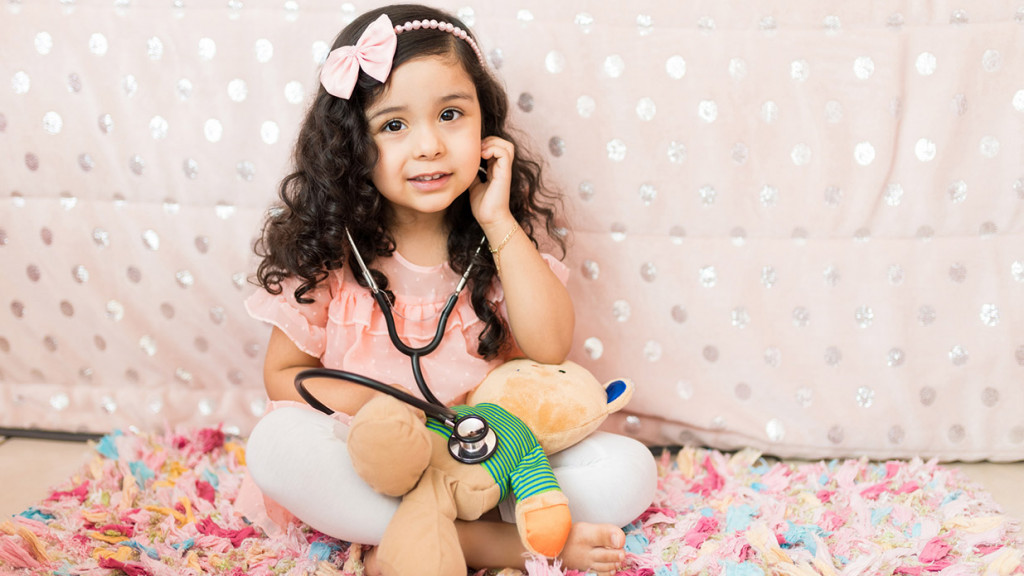Photo: iStockphoto
As a paediatrician and a mom, I try hard to stay on top of new advancements in kids’ health. But with so much news and information being published each month, I’m always worried that I’ll miss something. I know many parents feel that way too. So, here are six game-changing new guidelines and studies from 2019 that are important for both doctors and parents.
Get rid of your gentian violet for thrush
You may know gentian violet as the purple dye that has long been recommended for treating oral thrush or other fungal infections on the skin. But this product has now been pulled from Canadian pharmacies. Health Canada completed a safety review and concluded that, based on animal studies, there is a “potential link between gentian violet and cancer.” Still, some parenting, kids health, and online pharmacy websites still recommend or sell the product. Ask your primary care provider for a prescription antifungal instead, and return any old gentian violet you may still have in your medicine cabinets to the pharmacy.
Give peanuts and eggs to your infant early if allergies run in your family

19 trends that will affect parents in 2020
For decades, doctors have said to hold off on giving infants foods that are common allergy triggers but new research is turning that advice on its head. Studies now show that introducing these foods early decreases the risk of developing allergies. In a statement published in January, the Canadian Paediatric Society (CPS) is now advising that commonly allergenic foods— especially peanuts and cooked eggs—should be introduced around 6 months of age for infants if they, or a family member, have eczema, hay fever, asthma, or food allergies. You can do this by mixing a small amount of peanut butter or mashed cooked eggs into other purees or giving it on the tip of a spoon. Make sure to keep giving these foods a few times a week in order to maintain tolerance. So far, the science is not as strong that giving wheat, milk, and other allergenic foods early prevents allergies, but parents can go ahead and add them to their infants’ diets too.
Stop arguing about screen time and make screen use meaningful instead
In many homes, parents and their kids argue about how much screen time is too much. But, new guidelines from the Canadian Paediatric Society say parents should focus more on how screens are used rather than on how much they are used. While a 2017 statement for younger children recommended no screen time for kids under two and less than one hour for those two to five, the new guidelines for school-aged kids and teens don’t give a time limit. Moderation is still important, but the statement says that parents should help their kids choose “meaningful” screen activities—those that are developmentally appropriate as well as educational, social or active. Screen time should not interfere with normal routines such as sleep or mealtimes. The CPS says that parents can model the behaviours they want to see by playing video games or watching shows with their child to make them social activities, turning off their own devices an hour before bed and not checking phones during meals.
Choose other antihistamines over Benadryl for allergy symptoms
Although Benadryl and other generic allergy medications that contain diphenhydramine have been parents’ and doctors’ choice for allergies for decades, experts now say that they should be replaced by other antihistamines. The Canadian Society of Allergy and Clinical Immunology (CSACI) says these older medicines are not as safe or effective as newer antihistamines and should not be used routinely for hives or hay fever in children or adults. They are no longer recommended for anaphylaxis in children either.
Diphenhydramine, the active ingredient in Benadryl and many other medicines, is sedating, affects memory and concentration and can interfere with learning and school performance—and at high doses, the side effects are even more serious. Parents can choose from alternatives such as Reactine, Aerius, Claritin, Allegra and their generic equivalents. For children under two parents should consult their doctor before using any allergy medications.
Don’t keep kids in “bedroom jail” after a concussion
It used to be that a concussion meant no physical activity, no school, and no screens until the symptoms had resolved, but keeping a child quiet and still for days or weeks is not fun for kids or their parents. Now, concussion experts recommend a shorter rest period and only reducing, instead of stopping, cognitive and physical activity in the days following a concussion. The Ontario Neurotrauma Foundation and Parachute Canada say kids should rest their bodies and brains for only 24 to 48 hours before gradually adding activities again. This helps kids get safely back to their normal routine quicker and can prevent some of the potential long-term complications of a concussion, such as academic problems, social isolation, and depression. Even when your child has symptoms, such as a mild headache or decreased concentration, new activities can be added daily, as long as child is able to tolerate the and they don’t get worse. A doctor’s approval is needed though before your child or teen goes back to sports or driving. And make sure they avoid any activities that might cause another head injury.
Lock up cannabis products—especially edibles
With cannabis edibles hitting store shelves in most provinces this month or early in the new year, experts are warning that these products should be kept out of reach of kids. Many edibles appear identical to sweet treats such as gummy bears, gummy berries, sour keys and chocolates as well as baked goods like cookies, granola bars and rice crispy bars. The problem is that even one candy or one bite can be toxic for kids because the edibles are so potent. The Canadian Paediatric Society is collecting data on serious and life-threatening recreational cannabis exposures in children and in the first three months of legalization, they found 11 cases. Seven cases were “unintentional” cannabis ingestions and six of these involved candies or chocolates belonging to parents, caregivers or grandparents. So, don’t leave cannabis gummies or cookies on the counter. Instead, treat them like potential toxins for your child and lock them up.
With this new information under your belt, you can ring in the new year. But, staying on top of kids health information is just like parenting—as soon as you think you’ve got it, it changes. So, stay tuned for new developments in 2020.
Michelle Ward is a paediatrician, associate professor and journalist in Ottawa.
Read more:
Moisturizing could prevent food allergies and other baby skincare tips you need to know
Is it OK to give kids Gravol or Benadryl so they sleep on a plane?


